Lot details China, 1368-1644 (the mirror stand) and 618-907 (the mirror). The stand well cast, the recumbent beast with a long curved horn flanked by a pair of funnel-shaped ears, its head turned back, the spine supporting a mirror stand in the form of a crescent-shaped moon above a cloud cluster. The mirror of circular form and finely cast in the center with a crouching beast-form loop encircled by lions amid grapevines, and in the outer field with various birds and animals amid further grapevine below a foliate border. (2) Provenance: From the collection of Carl Johan Claëson (1879‑1963) and Greta Claëson (1887‑1978), and thence by descent in the family to the last owner. A copy of a picture taken c. 1950 in the appartment of the Claëson family, showing the present Xiniu bronze already together with the present Tang dynasty mirror, is accompanying this lot. Condition: Very good condition with minor wear and casting flaws, few minuscule nicks, tiny dents, occasional light scratches and losses. Weight: 1,091 g (the mirror stand) and 450.3 g (the mirror) Dimensions: Length 20.5 cm (the mirror stand), Diameter 13.6 cm (the mirror) The design of a Xiniu gazing at the moon appears for the first time in the Song dynasty and remains popular through the 13th and 14th centuries, appearing on Dingyao and Yaozhou bowls and dishes as well as textiles and elsewhere in Chinese decorative arts. A fine example is the Xiniu porcelain vase, Kangxi mark and period, in the present catalog, number 75. The Xiniu theme is discussed at length by Wirgin, in Sung Ceramic Designs, B.M.F.E.A., No. 42, Stockholm, 1970, pp. 196-198. According to Wirgin, the term hsi-niu (xiniu) meant rhinoceros in ancient Chinese texts, but the rhinoceros became extinct in the post-archaic period, and by the Song dynasty the xiniu had become a beast of legend, known only through literary references. The design of a xiniu gazing at the moon in Chinese ceramics and porcelains illustrates the popular myth that the beast magically “communicates with the sky” through its horn. The magical powers attributed to this horn continued to gain in popularity during later periods. Supernatural, medicinal and other valuable properties were attributed to it by Daoist adepts and medicine men, including the reputation for its powerful effect as an aphrodisiac. This eventually led to the production of rhinoceros horn bowls and cups in the 17th century, a category of decorative art unique to China. Auction result comparison: Type: Closely related Auction: Sotheby’s Hong Kong, 6 April 2016, lot 3670 Price: HKD 162,500 or approx. EUR 22,500 converted and adjusted for inflation at the time of writing Description: A bronze ‘xiniu’ mirror stand, Ming dynasty Auction result comparison: Type: Closely related Auction: Christie’s New York, 20 September 2013, lot 1481 Price: USD 12,500 or approx. EUR 15,500 converted and adjusted for inflation at the time of writing Description: A bronze ‘lion and grapevine’ circular mirror, Tang dynasty Expert remark: Note the identical size (13.6 cm) 明代犀牛望月銅鏡架,唐代海獸葡萄銅鏡 中國,鏡架1368-1644 年,銅鏡618-907年。鑄造精美,犀牛為俯臥狀,前蹄支地,似欲撐起上半身,後蹄自然壓於身下,回首望向背部由如意雲紋托起的月牙。牛首有角,雙眼有神。圓形銅鏡,伏獸鈕,弦紋高圈將鏡背紋飾分為內外兩區,內區高浮雕六隻海獸環繞鏡鈕、在葡萄葉蔓之間攀援嬉戲的瑞獸。瑞獸間飾以舒卷纏繞的葡萄枝蔓。外區飾一周同向環繞的瑞獸和鸞鳥。鏡緣處飾一周花卉紋。 來源:Carl Johan Claëson (1879‑1963) 與 Greta Claëson (1887‑1978) 收藏,在同一家族保存到最後一任主人。隨附一張拍攝於約1950年在克萊森家的公寓照片的複本,展示了現在的犀牛鏡架和鏡子。 品相:狀況極好,有輕微磨損和鑄造缺陷,微小的刻痕和凹痕、局部輕微的劃痕和缺損。 重量:鏡架1,091 克,銅鏡450.3 克 尺寸:鏡架長 20.5 厘米,銅鏡直徑 13.6 厘米 犀牛望月的圖案首次出現在宋代,一直流行到十三至十四世紀,在定窯、耀州碗碟、紡織品等地方都可以看到。在此次拍賣中就有一件康熙款及年代青花釉裏紅犀牛望月瓶,拍品編號75。 關於“犀牛”這個主題可以在 Wirgin,《Sung Ceramic Designs,B.M.F.E.A.,No. 42,Stockholm 1970年,第 196-198頁 中討論。據Wirgin所說,“犀牛”到了宋代,犀牛已成為傳說中的野獸,僅通過文學參考才知道。中國陶瓷器皿中的犀牛觀月圖案,闡釋了野獸通過角神奇地“與天溝通”的神話,十分流行。道教和藥師認為它具有超自然、藥用和其他有價值的特性。這最終導致了十七世紀犀牛角碗和杯子的產生。 拍賣結果比較: 形制:非常相近 拍賣:香港蘇富比,2016年4月6日,lot 3670 價格:HKD 162,500(相當於今日EUR 22,500) 描述:明代犀牛望月銅鏡架 拍賣結果比較: 形制:非常相近 拍賣:紐約佳士得,2013年9月20日,lot 1481 價格:USD 12,500(相當於今日EUR 15,500) 描述:唐狻猊葡萄紋銅鏡 專家評論:請注意幾乎相同的尺寸 (13.6厘米)。
Lot details China, 1368-1644 (the mirror stand) and 618-907 (the mirror). The stand well cast, the recumbent beast with a long curved horn flanked by a pair of funnel-shaped ears, its head turned back, the spine supporting a mirror stand in the form of a crescent-shaped moon above a cloud cluster. The mirror of circular form and finely cast in the center with a crouching beast-form loop encircled by lions amid grapevines, and in the outer field with various birds and animals amid further grapevine below a foliate border. (2) Provenance: From the collection of Carl Johan Claëson (1879‑1963) and Greta Claëson (1887‑1978), and thence by descent in the family to the last owner. A copy of a picture taken c. 1950 in the appartment of the Claëson family, showing the present Xiniu bronze already together with the present Tang dynasty mirror, is accompanying this lot. Condition: Very good condition with minor wear and casting flaws, few minuscule nicks, tiny dents, occasional light scratches and losses. Weight: 1,091 g (the mirror stand) and 450.3 g (the mirror) Dimensions: Length 20.5 cm (the mirror stand), Diameter 13.6 cm (the mirror) The design of a Xiniu gazing at the moon appears for the first time in the Song dynasty and remains popular through the 13th and 14th centuries, appearing on Dingyao and Yaozhou bowls and dishes as well as textiles and elsewhere in Chinese decorative arts. A fine example is the Xiniu porcelain vase, Kangxi mark and period, in the present catalog, number 75. The Xiniu theme is discussed at length by Wirgin, in Sung Ceramic Designs, B.M.F.E.A., No. 42, Stockholm, 1970, pp. 196-198. According to Wirgin, the term hsi-niu (xiniu) meant rhinoceros in ancient Chinese texts, but the rhinoceros became extinct in the post-archaic period, and by the Song dynasty the xiniu had become a beast of legend, known only through literary references. The design of a xiniu gazing at the moon in Chinese ceramics and porcelains illustrates the popular myth that the beast magically “communicates with the sky” through its horn. The magical powers attributed to this horn continued to gain in popularity during later periods. Supernatural, medicinal and other valuable properties were attributed to it by Daoist adepts and medicine men, including the reputation for its powerful effect as an aphrodisiac. This eventually led to the production of rhinoceros horn bowls and cups in the 17th century, a category of decorative art unique to China. Auction result comparison: Type: Closely related Auction: Sotheby’s Hong Kong, 6 April 2016, lot 3670 Price: HKD 162,500 or approx. EUR 22,500 converted and adjusted for inflation at the time of writing Description: A bronze ‘xiniu’ mirror stand, Ming dynasty Auction result comparison: Type: Closely related Auction: Christie’s New York, 20 September 2013, lot 1481 Price: USD 12,500 or approx. EUR 15,500 converted and adjusted for inflation at the time of writing Description: A bronze ‘lion and grapevine’ circular mirror, Tang dynasty Expert remark: Note the identical size (13.6 cm) 明代犀牛望月銅鏡架,唐代海獸葡萄銅鏡 中國,鏡架1368-1644 年,銅鏡618-907年。鑄造精美,犀牛為俯臥狀,前蹄支地,似欲撐起上半身,後蹄自然壓於身下,回首望向背部由如意雲紋托起的月牙。牛首有角,雙眼有神。圓形銅鏡,伏獸鈕,弦紋高圈將鏡背紋飾分為內外兩區,內區高浮雕六隻海獸環繞鏡鈕、在葡萄葉蔓之間攀援嬉戲的瑞獸。瑞獸間飾以舒卷纏繞的葡萄枝蔓。外區飾一周同向環繞的瑞獸和鸞鳥。鏡緣處飾一周花卉紋。 來源:Carl Johan Claëson (1879‑1963) 與 Greta Claëson (1887‑1978) 收藏,在同一家族保存到最後一任主人。隨附一張拍攝於約1950年在克萊森家的公寓照片的複本,展示了現在的犀牛鏡架和鏡子。 品相:狀況極好,有輕微磨損和鑄造缺陷,微小的刻痕和凹痕、局部輕微的劃痕和缺損。 重量:鏡架1,091 克,銅鏡450.3 克 尺寸:鏡架長 20.5 厘米,銅鏡直徑 13.6 厘米 犀牛望月的圖案首次出現在宋代,一直流行到十三至十四世紀,在定窯、耀州碗碟、紡織品等地方都可以看到。在此次拍賣中就有一件康熙款及年代青花釉裏紅犀牛望月瓶,拍品編號75。 關於“犀牛”這個主題可以在 Wirgin,《Sung Ceramic Designs,B.M.F.E.A.,No. 42,Stockholm 1970年,第 196-198頁 中討論。據Wirgin所說,“犀牛”到了宋代,犀牛已成為傳說中的野獸,僅通過文學參考才知道。中國陶瓷器皿中的犀牛觀月圖案,闡釋了野獸通過角神奇地“與天溝通”的神話,十分流行。道教和藥師認為它具有超自然、藥用和其他有價值的特性。這最終導致了十七世紀犀牛角碗和杯子的產生。 拍賣結果比較: 形制:非常相近 拍賣:香港蘇富比,2016年4月6日,lot 3670 價格:HKD 162,500(相當於今日EUR 22,500) 描述:明代犀牛望月銅鏡架 拍賣結果比較: 形制:非常相近 拍賣:紐約佳士得,2013年9月20日,lot 1481 價格:USD 12,500(相當於今日EUR 15,500) 描述:唐狻猊葡萄紋銅鏡 專家評論:請注意幾乎相同的尺寸 (13.6厘米)。
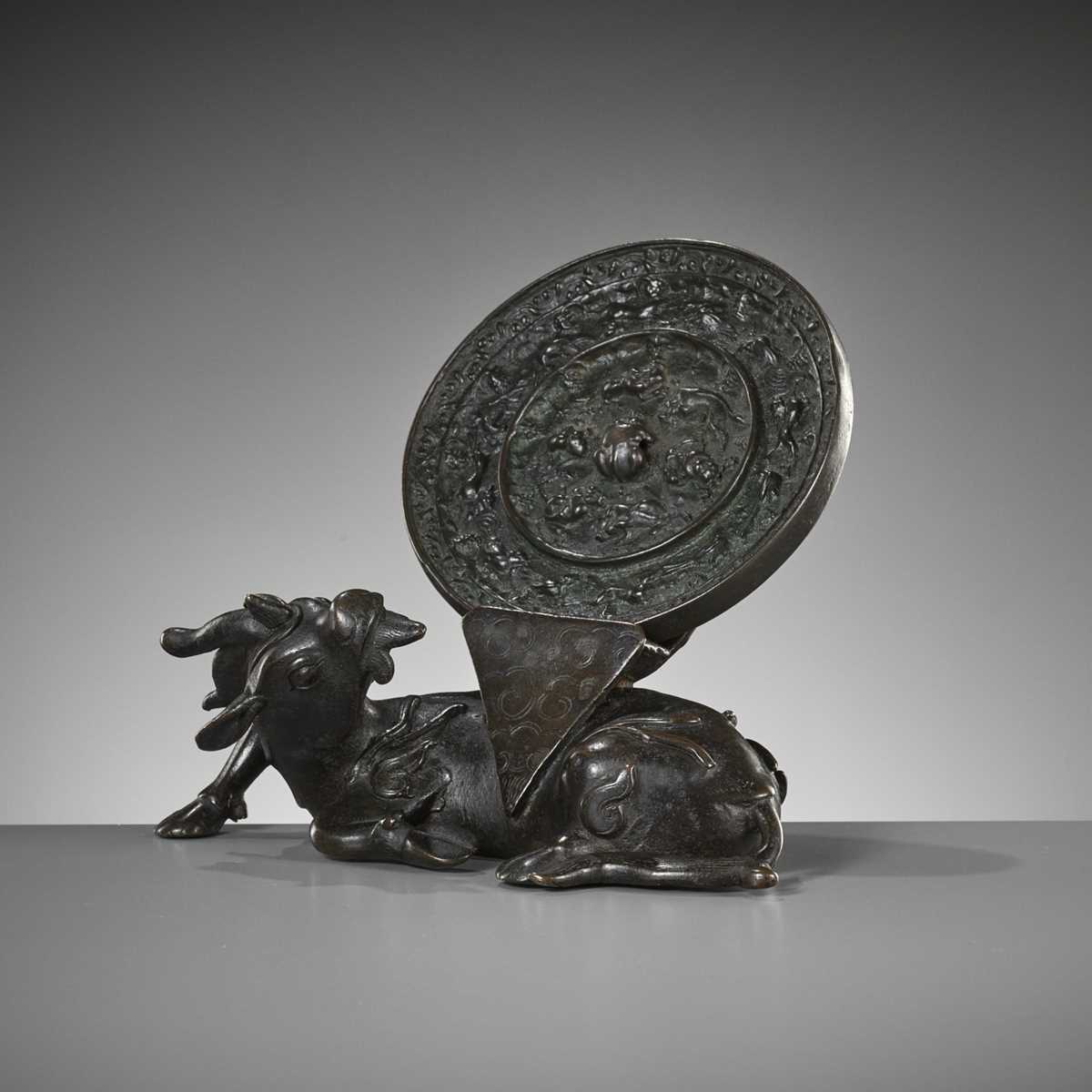
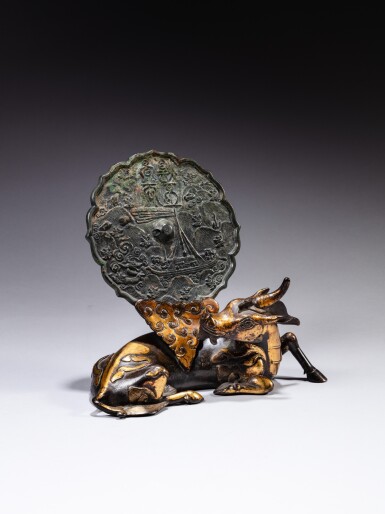
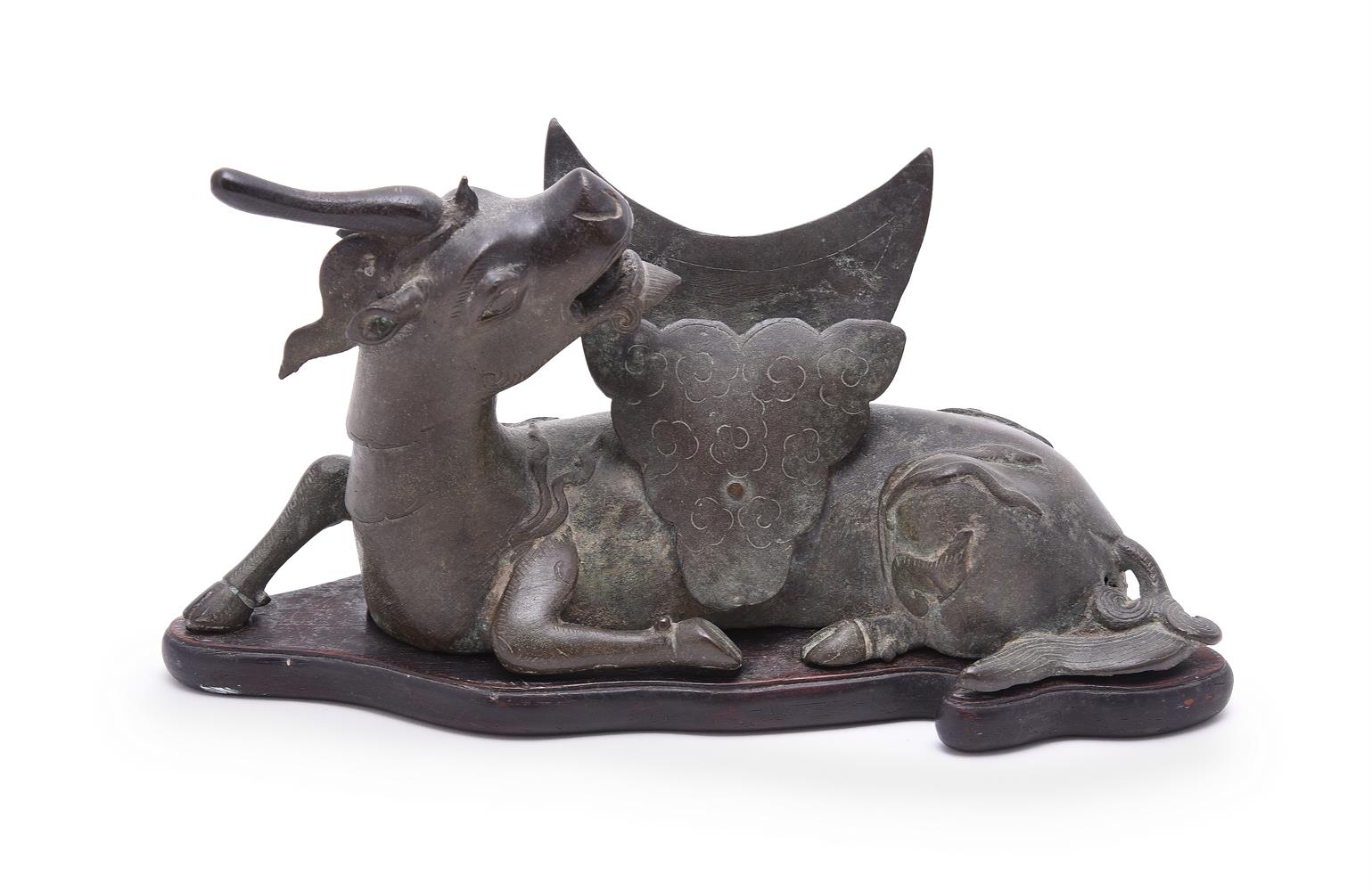



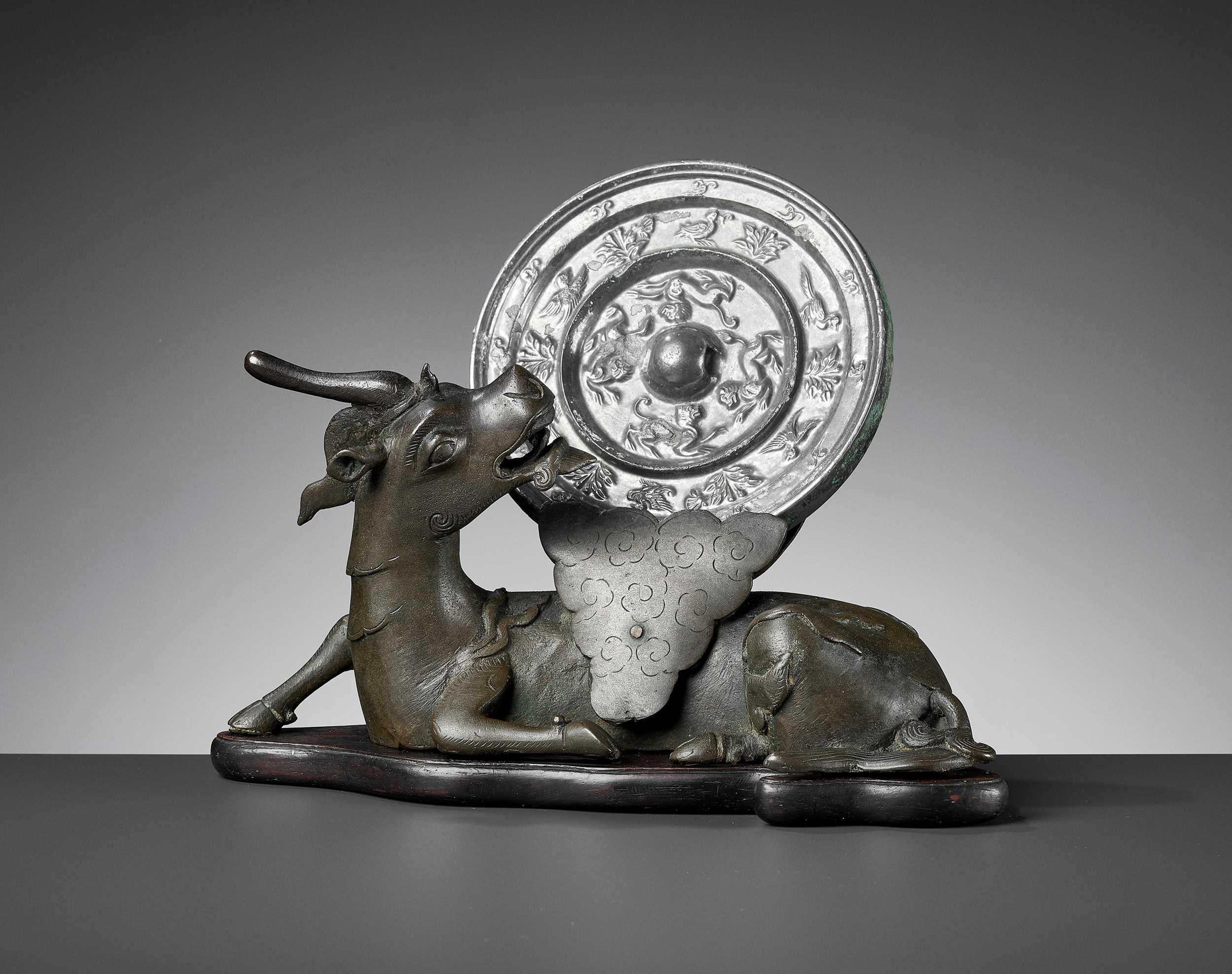
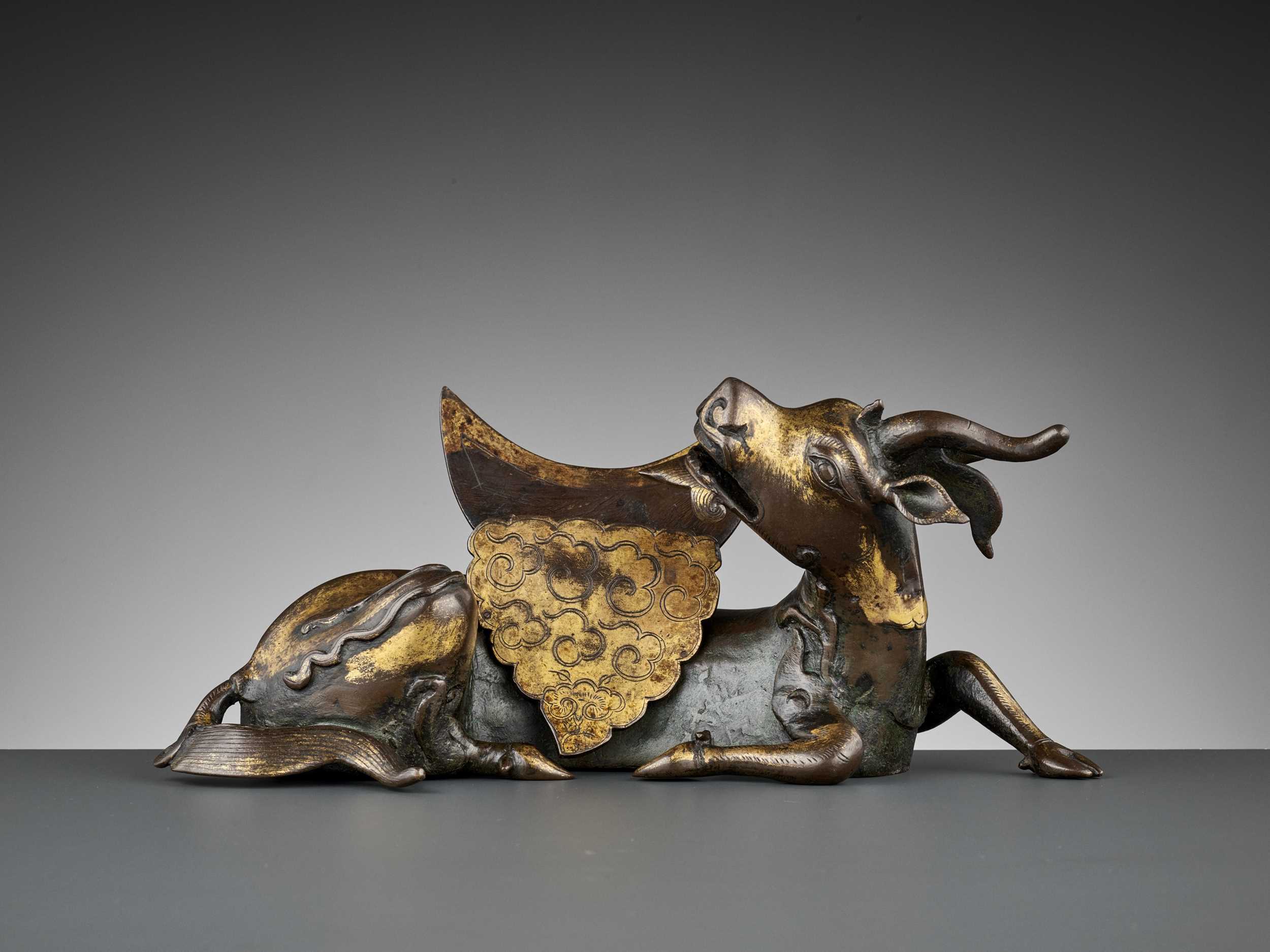





Try LotSearch and its premium features for 7 days - without any costs!
Be notified automatically about new items in upcoming auctions.
Create an alert